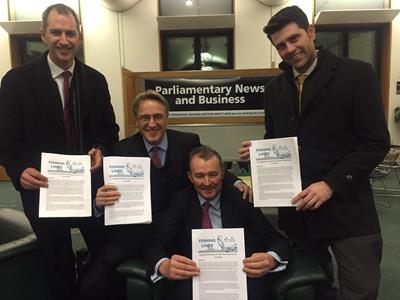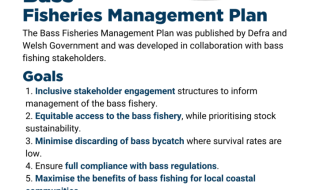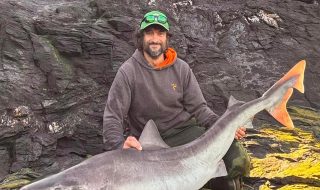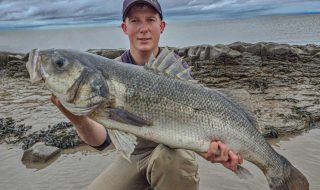Ministers agree to work on long term bass management plan as MPs prepare to debate new EU restrictions
Representatives from the Angling Trust and the Bass Anglers Sportfishing Society (BASS) have been battling for bass again this week and challenging both UK ministers and the European Commission over the unfair restrictions that are now in place on recreational anglers and the need for a proper, proportional and effective package of short term conservation measures coupled with a long term management plan that will rebuild bass stocks and deliver the best possible outcomes.
Yesterday (Feb 2) supportive MPs from the All Party Parliamentary Angling Group – Simon Hart, Charles Walker and Scott Mann – accompanied Angling Trust Chief Executive Mark Lloyd and Campaigns Chief Martin Salter to meet with Environment Secretary Liz Truss and Fisheries Minister George Eustice.
The original proposals from the Commission included a complete bass fishing ban for commercial vessels and recreational anglers (including catch and release) in the first half of 2016 and in the second half of 2016 a monthly one tonne catch limit for vessels targeting sea bass and a one fish per day bag limit for recreational anglers.
The politicians were told that:
- Anglers were pleased to retain catch and release but angered when EU Fisheries Ministers caved in to pressure from commercial fishing interests and granted four month exemptions to commercial hook and line and the highly damaging bass fixed gill net fishery – responsible for 50% of landings – wrongly referred to as “low impact”
- This anger was compounded when ministers sought to portray the decision as good news for bass when in fact the monthly vessel catch limits were increased to 1.3 tonnes at the same time as anglers faced draconian restrictions. Thousands of anglers are now at risk of criminalisation if they try to keep the self-same bass that a netsman is free to kill during the moratorium.
- Recreational anglers were prepared to play their part in what we expected to be a fair, effective and proportionate package of measures that would help rebuild bass stocks but they have instead been singled out for regulation while the commercial nets will continue to take vast quantities of fish, much of which is unrecorded.
- The current situation cannot endure. The recreational bag limits are grossly unfair, make an ass of the law and fail to acknowledge that recreational sea angling is the most sustainable form of bass fishing which delivers the best economic return.
Ministers accepted the proposal from the Angling Trust and BASS to work with Defra officials on a long term management plan for bass as was first suggested in the 2004 Net Benefits Report by the Cabinet Office. This would include both domestic measures like bass nursery areas and EU wide proposals ahead of the December 2016 Fishing Opportunities meeting.
Commenting on this potential breakthrough, Martin Salter said:
“Fair play to ministers for meeting some of their strongest critics and being willing to work with recreational anglers on trying to secure a long term future for the bass fishery rather than simply responding to short term commercial pressures.
“Making year on year decisions simply in reaction to ICES advice and EU proposals is no prescription for achieving sensible policy. The current situation is risking ignoring the lessons of previous stock collapses and forcing the introduction of a complete moratorium on all forms of bass fishing which would be a disaster. We must learn from good practice in the USA and elsewhere which delivers agreed resource sharing by species in line with good fishery management advice, best scientific evidence and key economic objectives.”
Long time bass campaigner Malcolm Gilbert said: “There has been a deluge of representations on the bass issue to George Eustice and Defra and in my opinion it’s right that we see a more assertive representation of recreational sea anglers’ interests. The Minister’s agreement for his officials to work with the Angling Trust and BASS to develop a long term management plan for bass is good news but both the content of such a plan and the willingness to take it forward will ultimately depend on continued political representation of anglers and all the businesses supported by recreational sea angling.”
Meanwhile in Brussels…
On Monday (Feb 1) a delegation of representatives from the European Anglers Alliance and European Fishing Tackle Trade Association met with the European Commission in Brussels to discuss measures to conserve bass. The EAA and EFTTA representatives, including David Mitchell from the Angling Trust, expressed the injustice felt by hundreds of thousands of recreational anglers who feel disproportionately impacted by conservation measures agreed in December 2015 by the European Council.
David Mitchell, Secretary of the EAA Sea Sub-Group said: “The Commission listened to our concerns and took on board what we had to say. I was particularly pleased that a proposal for a monthly, rather than daily, bag limit for recreational fishing will be considered in more detail. We need to work with the Commission to build the case. This would go some way to ensuring anglers felt they were receiving a fairer deal in access to our publicly owned bass stocks.”
Back in Westminster…
This week, newly elected North Cornwall MP and keen angler Scott Mann was successful in his bid to secure a three hour backbench debate in the House of Commons entitled: ‘Conservation of sea bass and the effect of related EU measures on the UK fishing industry’.
The Angling Trust and BASS will be supporting Scott in his efforts to highlight the need to create a sustainable recreational bass fishery delivering maximum economic benefit to coastal communities.






